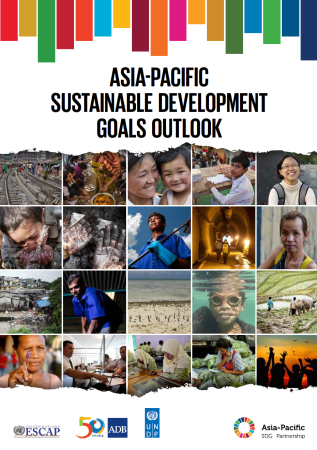ACTIONS
- Protect and safeguard cultural and natural heritage
- Learning and educational opportunities
- Cultural participation/social inclusion
- Sustainable tourism
- Support research
- Employment (recruiting, training, safety)
- Energy consumption, greenhouse gas emissions
- Waste management and reduction
- Transport (forms of, energy use)
- Commercial activities including copyright and IP
- Governance and management
- Security, disaster preparedness, risk reduction
- External partnerships and collaborations
- Publication/report
Asia-Pacific Sustainable Development Goals Outlook

Intended Audience
Policy makers, officials, and anyone who is interested in contributing to the SDGs in Asia and the Pacific
- Asian Development Bank, United Nations Economic and Social Commission for Asia and the Pacific, United Nations Development Programme
“This report examines each of the 17 Sustainable Development Goals (SDGs) and describes the outlook for achieving each one in the Asia-Pacific region. It singles out “bright spots” and “hot spots”, provides insights about each goal and points to emerging issues and reveals many of the common challenges that governments will confront as they work to develop appropriate responses to the 2030 Agenda for Sustainable Development. It represents a preliminary but comprehensive stocktaking effort in the region to provide the best available knowledge that can help governments, regional agencies and other development actors as they forge the much-needed social and political consensus on the gaps and priorities for achieving each SDG.”
Avaiable in
- English
SDGs LINKAGES
This resource is an accessible way for users to understand current and emerging issues in terms of the implementation of the Sustainable Development Goals (SDGs) in Asia and the Pacific. This resource, thematically, covers all the SDGs and their respective SDG targets. However, as a tool, it helps contribute to the following SDG targets: 10.2 (empowerment and promotion of social, economic, and political inclusion of all), 16.6 (transparent institutions at all levels), 16.10 (access of information), 17.6 (enhancement of North-South and international cooperation on knowledge-sharing), 17.14 (policy coherence for sustainable development), 17.16 (enhancement of global partnerships and multi-stakeholder partnerships), and 17.17 (promotion of effective public, private, civil and society partnerships).
Click on the SDG Target to discover Our Collections Matter indicators
-
Our Collections Matter indicators:
- Collections development to ensure that collections effectively meet the needs of all, irrespective of age, sex, disability, race, ethnicity, origin, religion or economic or other status.
- Number and proportion of educational and participatory programmes that promote participation irrespective of social or other status.
- Numbers and proportions of people making use of collections in relation to the demographic of the local population.
- Numbers and proportions of people involved in focused programmes aimed at promoting social, economic and political inclusion.
- Numbers and proportions of people from different demographic groups involved in decision-making processes relating to collections and collections-based institutions.
- Number and types of partnerships that build relationships with marginalized groups, individuals and communities.
-
Our Collections Matter indicators:
- Proportion of the population [audience/users/non-users] satisfied with their last experience of public services.
- Access to information, and accountability policies and mechanisms, in place.
- Effective institutional arrangements, both for own working and for working in partnership with other sectors, in place.
- Plans and arrangements in place for extraordinary circumstances such as natural and human-caused disasters.
- Effective arrangements in place to fulfil legal and social obligations and responsibilities.
- Effective arrangements in place for transparent communication and reporting of institutional performance.
- Effective arrangements in place for transparent decision-making and accountability.
-
Our Collections Matter indicators:
- Adopt and implement constitutional, statutory and/or policy guarantees for public access to information.
- Plans in place, and plans implemented to enhance public access to information relating to collections.
- Plans in place, and plans implemented to support fundamental freedoms, in line with human rights, national and international agreements and legislation.
- Plans and procedures in place for public access to information relating to the operation and management of collections-based institutions.
- Complaint mechanism in place for public to use where public access to information and fundamental freedoms not supported or fulfilled.
-
Our Collections Matter indicators:
- Proportion of policies that incorporate sustainable development considerations, linking to SDGs and targets.
- Incorporation of policy considerations from outside the collections sector into policies of collections-based institutions, to facilitate partnerships and effectiveness.
-
Our Collections Matter indicators:
- Number and/or increase in number, and diversity of global and international multi-stakeholder partnerships that share collection-related knowledge, expertise, technology and financial resources to address the SDGs, or that otherwise involve collections-based organisations and institutions.
- Number and/or increase in number, and diversity of global and international multi-stakeholder partnerships involving developing countries that share collection-related knowledge, expertise, technology and financial resources to address the SDGs.
-
Our Collections Matter indicators:
- Amount of United States dollars committed to public-private and civil society partnerships.
- Number and/or increase in number, and diversity of local, national and regional multi-stakeholder (public, public-private and civil society) partnerships that address the SDGs drawing on collections, or that otherwise involve collections-based organisations and institutions.
-
Our Collections Matter indicators:
- Number and diversity of North-South, South-South and triangular co-operations and projects to support access to science, technology and innovation and enhance knowledge-sharing on mutually agreed terms.
